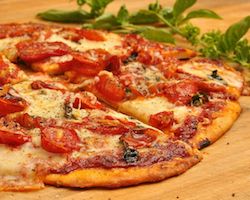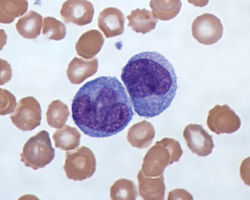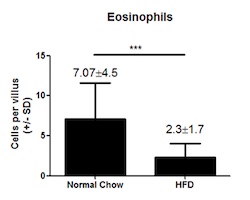
Fatty Foods May Lead to a Leaky Gut
What's in the Story?
What do you love to eat at a birthday party? Maybe pizza and ice cream or another yummy combination. Although these foods are delicious, eating these “fatty foods” all of the time can make your body sick.

When you eat your favorite food, that meal makes its way to your stomach and then down your gut. The gut is a long continuous tube starting from the stomach and ending at the anus. The cells of your gut have many finger-like projections called “villi”. Villi help break apart the food as part of the process that converts what you eat into energy you can use. Not only do villi help us break apart the food into smaller pieces to move food along our guts but they also help create a wall.
The gut wall prevents harmful chemicals from entering your gut and causing disease. Just in case your gut wall is under attack by harmful chemicals, you have cells in your body that can fight them off. These warrior cells are known as “white blood cells”.
In the PLOS ONE article “High Fat Diet Causes Depletion of Intestinal Eosinophils Associated with Intestinal Permeability,” researchers looked at how fatty foods can destroy the white blood cells in our bodies. The loss of white blood cells can lead to holes in our gut barriers that cause a disease called “leaky gut”.
Your Gut is a Castle

Sitting on the top of a hill is a beautiful brown castle surrounded by a deep, wide ditch filled with water; a defense against attacks. The castle has strong walls built for battle, but if the enemy has large rocks that can tear down the wall, it leaves holes in the castle’s defense. Your gut works in the same way. Fatty foods can release harmful chemicals that can create holes in your gut wall.
Researchers believe that eating too many fatty foods without the addition of fruits and vegetables can cause someone to gain a lot of weight. This extreme weight gain is known as obesity. The fat that someone gains while eating fatty foods can release harmful chemicals called pro-inflammatory cytokines. These are cytokines that cause inflammation, or local tissue swelling, redness, and pain. These harmful chemicals can break down the wall that our gut has created to keep us healthy.
Fatty Diets
Fats give the food we eat a ton of flavor and texture. However, eating too much fat can cause serious health problems for kids and adults. Fatty foods include lots of easily available foods like potato chips, pizza, cookies and cakes. Fast foods also tend to have more fat than the normal recommended amount. Sugary foods can also increase fat absorption.
White Blood Cells to the Rescue

Not to worry, your gut has a second line of defense! If there are some holes in your gut, white blood cells are signaled to come and help. White blood cells flow through the blood and play a major role in defending our bodies from disease-causing chemicals.
Your gut also has special white blood cells that protect it from harmful bacteria and the chemicals that they release. Eating too much fat can actually destroy our warrior white blood cells… but how does this happen?
Holes in the Castle
To answer this question, researchers divided 18 mice into two groups. Nine mice were given a “chow” diet for a month, which means they were fed a diet that is healthy for mice. The remaining 9 mice were given a fatty diet for a month. Before the start of the diet and at the end of each diet, they collected poop samples from each of the mice. The samples were put into a solution and the concentration of cytokines that cause inflammation were recorded.
White blood cells in the gut tissue were also counted, along with holes in the gut at the end of the diet. The guts were placed on a machine that measures the amount of water that flows through the gut wall. This machine can let researchers know if there are any holes in the gut.
Fatty Foods Decrease Warrior Cells in the Gut
Researchers found that the level of white blood cells in the gut of mice was affected by diet. Mice given a fatty diet for a month had lower levels of white blood cells than mice fed a normal healthy diet. White blood cells are important to the gut because they help fight off infection after consuming fatty foods.

A fatty diet can also increase the number of holes that are present in the guts of these mice. Scientists are still doing work to understand how and why fatty foods cause disease in the guts of mice. But what does this mean for humans?
Can Fatty Foods Harm People Too?
Other studies have found that if people eat fatty foods for a long time, their guts and white blood cells could be affected. If there are more holes in our guts, then cytokines can leak through (“leaky gut”). If harmful chemicals get into our blood, they can cause diabetes, a disease where the body cannot use sugar properly.
So as you make decisions on what to eat, remember to think of your body as a castle. It will be harder to protect it from disease if too many fatty foods make holes in it.
Additional images via Wikimedia Commons. Colon tissue image by CoRus13. Hamburger thumbnail by Michael Stern.
Bibliographic details:
- Article: Fatty Foods May Lead to a Leaky Gut
- Author(s): Meli'sa Crawford
- Publisher: Arizona State University School of Life Sciences Ask A Biologist
- Site name: ASU - Ask A Biologist
- Date published:
- Date accessed:
- Link: https://askabiologist.asu.edu/plosable/fatty-foods-leaky-gut
APA Style
Meli'sa Crawford. (). Fatty Foods May Lead to a Leaky Gut. ASU - Ask A Biologist. Retrieved from https://askabiologist.asu.edu/plosable/fatty-foods-leaky-gut
Chicago Manual of Style
Meli'sa Crawford. "Fatty Foods May Lead to a Leaky Gut". ASU - Ask A Biologist. . https://askabiologist.asu.edu/plosable/fatty-foods-leaky-gut
Meli'sa Crawford. "Fatty Foods May Lead to a Leaky Gut". ASU - Ask A Biologist. . ASU - Ask A Biologist, Web. https://askabiologist.asu.edu/plosable/fatty-foods-leaky-gut
MLA 2017 Style

Be Part of
Ask A Biologist
By volunteering, or simply sending us feedback on the site. Scientists, teachers, writers, illustrators, and translators are all important to the program. If you are interested in helping with the website we have a Volunteers page to get the process started.
